

.
ON October 18th, just five days after the dispersal of our hospital at Charing Cross, a telegram was handed to us, saying "Meet the nine-thirty boat train, Victoria, tonight." In delighted excitement we again packed our holdalls and caught the train to London. At Victoria we were met by our kind friend, Mr. Souttar, the eminent London Hospital surgeon. We found that our hospital staff had left the previous night, and owed our being included in it to Mr. Souttar. Either we were difficult to reach in a hurry, or they had not forgotten our independence at Ostend, but we certainly should have been overlooked had it not been for this gentleman. We were placed in charge of the Duchess of Sutherland, who had a hospital unit at St. Malo, a suburb of Dunkerque. Arrived there we spent the next day and night at the St. Malo Hotel. The Germans gave us a warm reception that night; a squadron of airplanes bombarded Dunkerque, shelling the quays where the ammunition was stored. We leaned out of window, gazing over the sea at the battle in the air, listening the while to loud explosions.
Our new hospital was located in Furnes, a quaint little town fifteen miles to the east of Dunkerque, and about three or four miles west of Nieuport, whilst the seaside resort of La Panne was just two or three miles to the north. Ypres was fifteen to twenty miles south of Furnes. Each day an ambulance drove into Dunkerque for the mail and to buy provisions. It was this ambulance that took us out to our new sphere of work.
The building in which we worked was a large Roman Catholic College; the principal and professors were still living in it. It was a large rambling building covering a good deal of ground. There were two big courtyards, one of them devoted to the motor-cars and ambulances, which really formed a squadron. Across the inner courtyard from the main part was a building containing two large classrooms on the ground floor, and upstairs one huge dormitory where we all slept. There were other small class-rooms round, which served several purposes: laundry, wards and operation-theatre.
The scene in that great place was one of bustling life and activity all the twenty-four hours round. In spite of constant contact with suffering, misery and death, to us doctors and nurses there was a great share of happiness and the joy of life. It is a great thing to feel you are fighting death and saving heroes, besides which we were a very happy crowd. There were now twenty-six nurses, mostly new ones; we had with us the same three medical students and two or three of our former men-doctors, but the four lady-doctors had left us, and in their place we had three or four new men-doctors and one lady-doctor as an anæsthetist and surgical store-keeper.

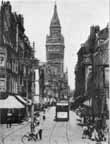
The lady-farmers had left us, and the number of non-medical people was reduced to a minimum. Now, for the first time, we had orderlies---the ex-professors became our willing helpers and the most devoted and capable attendants of the patients. I cannot speak highly enough of them. These men, who had spent their lives as leaders of classes, cleaned grates, swept floors, scrubbed and attended to all the menial wants of the patients. By degrees the younger amongst them were taken by the army and replaced by men released from Holland who, under the Treaty of Geneva, must not fight again.
At that time Furnes was the Headquarters of the Belgian Army, and the quaint Hôtel de Ville, dating from 1582, was King Albert's Army Quarters. The old-world market square was filled with every sort of war vehicle; officers occupied the inns and soldiers swarmed everywhere, sleeping at night in the Cathedral and another great church where straw was spread on the floor for them. Queen Elizabeth lived at La Panne, where there were hospitals and many convalescents. It was never shelled.
We lived in Furnes from October 18th to January 15th. All the time we were in Belgium we were never out of hearing of the constant boom and thunder of artillery, and at night the sky was afire with the battle going on to the east of us, about three miles away. Our life was a complex thing to describe; there was a constant coming and going of outsiders. People came to Furnes to see things---great people. The college being large and other accommodation in the town nil, we put them up, and they were our guests for the time being.
Attached to us was a most interesting body of people, "The Munro Ambulance Corps." Dr. Munro was its chief. He is now Sir Hector Munro. With him, driving ambulances, were many well. known people; just a few names I remember---Lady Dorothy Feilding, the eldest son of General Melisse, head of the Belgian R. A. M. C., Dr. Jellett, the Dublin gynæcologist; Claude and Alice Askew, the novelists (since drowned in a submarine attack); Miss McNaughton, authoress; Mrs. Knocker and Miss Chisholme; Mr. Hunt of Yokohama and Mr. Sekkar, a great sport and our good friend. All their ambulances were stored in our front yard, numbering over twenty. With them were four jolly young gentlemen-amateur chauffeurs who soon became our friends. These people worked mostly at night, gathering the wounded and removing them under cover of darkness. We received all those who could not travel further into France.
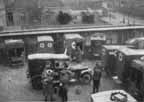
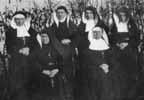
Our dining-room was great! It was really the kitchen. A big stove covered with immense pots occupied one side. In front of it stood our chef, an ex-patient named Maurice. He was the sunniest fellow I ever met. He came in with the first batch of Furnes wounded, shot through the throat. When he laughed it sounded like a tin whistle blown by an amateur. He had been a cook, and when he was well the Queen gave him to us as chef. He wore a baker's cap and apron, presiding at all the festivities. Under him were seven refugee nuns in voluminous black dresses and white caps like airplanes. They peeled potatoes and washed dishes. There were three trestle-tables covered with check oilcloth; we each helped ourselves to an enamel pint-mug, lead spoon and fork, and taking a bowl to the stove it was filled with coffee, soup or "bullybeef."
For several weeks we lived on that stand-by of our Tommies. Disguise it as you will, in pie, rissole or curry, hide it under all the Parisian names you can find in a French cookery-book, at the first taste it just jumps up and shouts "Here we are again!" The other three articles which comprised our menu were coarse, wet, black bread, rancid butter from the Tommies' rations, and a dainty which resembled a bath-room-tile in size, shape and consistency, and which I firmly believe was Spratt's Dog Biscuits!
We all sat together at these crowded tables, lords and ladies, chauffeurs, doctors and nurses. Once even, later on, we gave a dinner party, our guest being no less a personage than a Royal Prince of England. After the sun set the most impressive feature in Furnes was the darkness. Every house was shrouded in gloom. The streets were black. Our hospital was invisible except for a glimmering candle or cheap, evil-smelling lamp here and there. Never shall I forget that first night! The Battle of the Yser had just begun, and before we had got settled we were inundated with stretchers laden with groaning, bleeding men. By a guttering candle we examined their wounds.
My friend and I, with two new Sisters, were in charge of a large ward, one of the big class-rooms. We were awfully short of all the appliances we consider indispensable to a hospital. Many of our beds consisted of sacking filled with straw or shavings. We rarely had a sheet and no mackintoshes in those early days. Stretchers lay all over the floor with men who were covered with mud and blood. In our ward there was a little elderly lady who quietly offered her services, and as she looked capable I sent her to clear away the evening meal and wipe down the tables. She never bothered me again but quietly busied herself setting things in order.
 |
 |
 |
|
|
|
|
Soon two big oil-lamps relieved the darkness and some large scissors that we had longed for lay to hand to rip the men's clothes off them. The unassuming little helper had been out to buy them. A few days after, when we had time to breathe, we were introduced. It was Miss McNaughton, the writer of "A Lame Dog's Diary" and other books.
She stayed with us several days helping in our ward. After that she procured a tiny room at the station and ran a soup-kitchen for the wounded. Now, this sounds a homely and commonplace sort of occupation, but when you realize the circumstances you will know what courage it required.
As I said before, Furnes was the Army Headquarters. King Albert spent most of his time there, and it was filled with military. Also Furnes station was the junction for all the little local railways that ran out to villages and towns at the Front, now so well known to all of us. One constantly heard the guard shouting "Poelcappelle!" "Nieuport!" "Dixmude!" and many other names mentioned constantly in our present offensive. All the fresh troops and ammunition passed through here; all the wounded returned through here at night. Therefore Furnes, with the station as the bullseye of the target, was the constant centre of attention of the German artillery and airplanes.
Miss McNaughton was in the thick of it. She was a delicate little woman, highly strung and nervous, therefore it was particularly courageous of her to spend most of her time there peeling vegetables and stoking up furnaces. Often during that late autumn and winter when we had finished work we would take an after-supper walk to her tiny kitchen, a merry party of us. Sitting on sacks of potatoes and onions we would give her a hand preparing the midnight soup. Then, when the long ambulance trains shunted in at twelve, we would sally forth with trays of steaming mugs filled with hot soup and coffee, and, boarding the trains, give the eager sufferers on the stretchers a good hot drink to warm them up. Several shells hit the station. Once, when the collector was clipping tickets, his clipper was knocked out of his hand and his thumb blown off, whilst a thick pocket book over his heart saved his life, a piece of shrapnel being embedded in it.
After Christmas, Miss McNaughton moved to La Panne. That was when Furnes had grown too unhealthy for human beings. We spent a happy Sunday with her at her villa, where she was writing a book about her experiences. A young clergyman, who was one of our chauffeurs, went over to take a service at La Panne Hospital, so, as we three were all Miss McNaughton's friends, he took us along. We had quite an exciting time, coming home along the Ypres-Furnes Road. A Taube, spotting the Red Cross on top, thought he had some wounded to kill, so he followed us for miles, dropping shrapnel. It was great fun! I looked longingly at the fragments falling all over the road, but could not prevail on the parson to pull up whilst we gathered a few bits for presents to our home people. That clergyman was a great sport. He was not like a parson at all. Not only was he a chauffeur, but he was a Boy Scout troop commander and a skilled engineer and carpenter. We nurses were constantly indebted to him for shelves, stools, cosy corners, and other useful ward-furniture made out of old sugar cases, etc., in his spare time. The following spring while he was waiting for a batch of wounded at a dressing station, he used to go out into the fields and pick us nosegays of cowslips till bullets whistling through his hair made him realize that "discretion was the better part of valour." That young man afterwards went with General Townsend to the Relief of Kut, and was promoted a Captain. The Turks sent a bullet through his head, but after a few months' convalescence in India he is back at his post again, "Somewhere."
The reader must excuse all these excursions on to side-tracks. The fact is, nothing in our life was consecutive at Furnes, or later at Hoogestadt. It was just a series of pictures made up of interesting events and people.
First of all, at Furnes, there was a mad rush of work. While the Battle of the Yser was proceeding every nerve was strained day and night to cope with the work. Then after two or three weeks things died down to a few casualties each day. During that time we assumed more the nature of a Base-Hospital, and instead of packing off all who could travel next morning in ambulances, we nursed them to something approaching convalescence, or till another rush came. We had permanently attached to us two Belgian Colonels, a Major and some Lieutenants who examined the wounded each morning, placing tickets over the beds of those who were to be moved to France and England.
All this time the roar of heavy artillery went on by day and night. After dark we could trace the battle-line all along the east, from north to south by the blaze of guns and flares. Often Belgian and French airplanes would engage in sharp contests right over our heads, as the Taubes dropped their bombs down on the streets below. We all ran out to watch who would win, and once I saw a Taube hit, and fire burst out of its tail as it volplaned towards the cast in a cloud of smoke. Very soon after these little affairs some stretchers would arrive with wounded civilians.

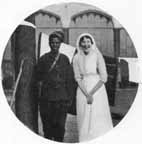
We had been in Furnes about ten days, when, late one evening, a proclamation was issued that we were to retire immediately to Poperinghe, so we all packed into the ambulances and sped away. No one gave us any reason; to us it was a joy-ride, but I suppose the authorities thought the Germans were about to break the line and enter Furnes. We went at a breakneck speed along dark country lanes, and at places the roads reminded one of an Arabian Night's Tale. By a little copse were pitched some tents, fires were burning on the ground, and attached to tripods pots were boiling, while Arab-Sheiks with white flowing garments, gay turbans, scarves and swarthy beards squatted around or at. tended to their horses.
At Poperinghe we found the British, and squares and streets were bustling with military life. The French were there also. How grand were the French Cuirassiers, seated on their handsome horses, wearing shining brass helmets and breastplates, while from the back of the helmets swept red or black plumes!
As usual, all the inns were filled with military. We came to a little estaminet where we all crowded in for a meal in the bar-room. But there was no sleeping accommodation. About midnight the nurses were quartered in a convent the other side of the town but we lost our way, and finally, tired out, found ourselves in the little white beds, enclosed with curtains, of a huge dormitory.
We spent three days at Poperinghe, when we were all taken back to Furnes again. Evidently the Germans found it too tough a job to break through. For the next two months we nursed French soldiers, as French troops were fighting on that section of the Front. It becomes almost monotonous to tell you again that all those hundreds and hundreds of men we nursed were far spent---suffering from shock collapse, excessive hemorrhage, broken to pieces, many mortally wounded, all in agony, suffering from cold, hunger, exposure to winter weather, frost bite, and every evil that can bring strong men to death's door. We had also a new trouble to contend with, gangrene had broken out, often of a malignant description. We isolated these and amputated limbs where possible to save them.

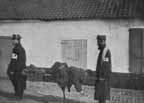
Tetanus appeared, but we soon obtained serums from England and gave all patients with wounds covering large surfaces a preventive injection. Often large pieces of clothing were embedded in wounds, to say nothing of shrapnel and mud. From beneath one man's shoulder-blade we even extracted a large brass time-fuse! We had one wonderful case of recovery in our large ward; an officer, with the rank of Major, was brought in with huge wounds in his abdomen, while his intestines were absolutely riddled with shot. The surgeons cut out twelve feet of entrails, and he made an excellent recovery! This was the more remarkable considering that all the patients surrounding him were suffering from dirty and festering wounds, and at that time we had no means of sterilizing the ward dressings. Later on we had large steam sterilizers in the theatre.
.
I TOLD you that in Furnes we nursed the French. That remark needs qualifying. Not only did we nurse the French "poilu," but amongst them were representatives from all the French colonies, black, brown and yellow men. Great black, woolly-haired Senegalese from East Africa, savages and cannibals, lay stretched out on our beds, or oftener on the floors, for we were overflowing. These poor fellows could not even speak French, and they suffered bitterly from the cold. As we passed them they would hold up big bandaged hands, wailing "Oh! Madame, oh! la! la! la! la!" There were also Turcos with red fezzes and baggy trousers, Zouaves with cutaway jackets, Algerians and Arab-Spahis with peculiar bowl-shaped turbans. Among them were Annamites from the Orient, members of the Legion-Étrangers, and French Alpinos with blue tam-o'-shanters.
One night we received Mr. R-----, editor of a noted sporting-paper. He had been out on a Munro ambulance and had run into a German scout party. The ambulance made a spurt for liberty. Mr. R----- sprang to the back of the car and hung on, at the same time being shot through both legs, which were broken. He was dragged along the road whilst the car bolted for life, the Germans firing after them. Even with both legs badly broken, he could not refrain from joking. We had him removed to England as soon as possible.
Mr. Sekkar, one of the Munro chauffeurs, was just loading up a car, when a piece of shrapnel made a great wound in his leg. He did not mention it, but continued to drive the car to Furnes whilst the blood ran on to the foot-board. He received no attention until he got to Furnes.
There was a certain little station just near the trenches which the Munro party often visited. Gathering the wounded from a dressing-station by the trenches, they drove them to the ambulance-trains waiting at this station. One November day I was taken out on one of the cars. We came to a place where four roads met, and here our ambulances pulled up. Just by the cross-ways was a battery of three French 75's. I sat on the car and watched them firing for a while, then, getting used to the deafening roar and trembling earth, I gradually drew nearer. On the ground were shells which looked like giant thermos-flasks, some red and some khaki; one colour burst up in the air as a timed, explosion; others burst upon contact.
Mr. Sekkar had said "Don't go too near, or you will be deaf." So I kept a little way off, near the officer who was shouting orders. It was most engrossing watching the great oven-door at the back open with clock work precision and the two soldiers lift in the shell and bolt the locks. Then, walking round to the side of the wheels, a soldier took a cord, gave it a sharp jerk, and lo!---the whole earth rocked. Flames shot out in a circle all round the rear of the gun, and the air was rent with an appalling roar. Then you heard the shell on its journey of eight or twelve miles, roaring, buzzing and humming off into the distance, followed by a faraway explosion.
One cannon after another performed this feat, with two minutes pause between each. Then there was some shifting of the gun into position again. The Major looked down at me and said, "Would you like to have a shot at the Boches?" and I said "Rather!" "All right. Put some wool in your ears, take hold of that string when I give the word and pull smartly!" I have often wondered where that shell landed and with what result.
Returning to my seat in the car we watched the German shells ploughing up the fields all round. What hundreds of shells they wasted trying to hit that battery!

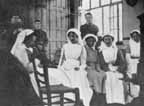
Everywhere in the fields in front of us the earth went up in dense clouds, leaving hills and holes behind. The little paved avenue in front of us was a "hot" place. It was impossible for us to traverse it till they moved their range to another spot. The Boches never got that battery, though they nearly got us. After dark they gave up the job, so we proceeded about half a mile down the lane, where we came to a dilapidated cottage. Out of the darkness we saw staggering soldiers, leaning on each other, flounder into the straw-strewn room.
Stretchers arrived constantly, borne by Red-Cross orderlies. We were used to death and dying at our hospital, but here we met despair. Most of those lying on that straw were in extremis---nothing could be done for them, grey ashen faces looked dully at us, they were mostly too bad to groan. It is dreadful to be impotent, to stand by grievously stricken men it is impossible to help, to see the death-sweat gathering on young faces, to have no means of easing their last moments. This is the nearest to Hell I have yet been. We put all the hopeful cases into our cars, driving one or two loads to the little station, and then returning for more, which we took back with us to Furnes.
Towards the end of November we took over the operation-theatre. Things were quieter then, as the Flemish mud made an offensive impossible. There was only the usual artillery-fire and small raids to deal with. Meanwhile a very cold winter had commenced. It was pitiful to see those poor Belgian soldiers without any comfortable quarters when out of the trenches. My friend and I had hired a bed-room in the town. We were very lucky, for our landlady was goodness itself to us. Just opposite our house there was a church built on the generous lines of a cathedral, and here a large detachment of soldiers was quartered, sleeping on straw on the stone flags. We used to watch them at dawn come out in the deep snow to a horse-trough, and, breaking the ice, strip to their waists and wash. After dusk we saw them marching in from the trenches in their ragged blue overcoats, caked in mud, carrying piles of accoutrement on their backs and spades and guns over their shoulders.
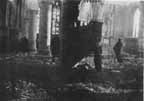

No warm home-coming for them, no fire to dry their clothes by, no hot meal ready. Just the dark, cold church. These men had no bundle of letters from home to cheer them; all they had to face was a desolated country, desecrated firesides, ruined homes, starving penniless families, violated womenfolk and suspense---not just for weeks or months, but for years, without news of all that life held dear for them. Do you wonder that they hate the Germans? In return they were paid three-half-pence per day. A few weeks ago I received a letter from a Belgian Captain whom I had nursed. He writes "Dear Sister, do you realize that it is now three years since I have received any news of my wife and three little ones? Are they alive or dead? The suspense has made an old man of me; at thirty-five my hair has turned grey with anxiety."
Most of our operations occurred at night, as the wounded travelled through the danger-zone with less risk of being fired upon after dark. During the day we performed operations on patients who had been in the wards for some time. Our doctors and nurses had no cosy sitting-room to rest in when off duty. There was only the busy kitchen stove for warmth; so we used to gather them in the theatre when there was no case to prepare for. What jolly times I remember in between the rushes of work! Our stove was always going, with a big kettle of boiling water ready for emergency cases, so about eleven A. M., after the nurses and doctors had done the morning round of dressings, we used to make a cup of tea.
One of the chauffeurs would bring in from Dunkerque a box of French pastries, or better still, some kind mother sent a lovely "tuck-box" containing an English homemade cake! Then the men would find their hair needed a barber's attention, so out came some scissors and a sheet, and we became pro tem. a hair-dresser's establishment! During the autumn rush of the Battle of the Yser we had so overflowed our borders that we were obliged to take in two small class-rooms, scattering straw thickly on the floor in lieu of mattrasses. It was a miserable arrangement, but better than the streets. Later on, in December, one of the class-rooms was turned into a sitting room for the staff. The couches consisted of crates, covered with red blankets; an old bedstead boarded up at one side, with a sack of shavings and blankets over it, made a fine Chesterfield couch! The students hired a gramophone and piano from Dunkerque, so we became quite civilized.


.
DECEMBER had arrived, and Christmas was approaching. We felt the excitement of it in the air. Every one wrote long letters home, asking for good things for all our hundred or more patients. The home-folk responded, and soon big crates arrived, both for patients and staff. My friend and I had a memorable joy-ride to Dunkerque. After months of darkness, mud and shuttered shops, what a delight to see gay streets filled with stores, all gorgeous in a Christmas fairyland of decoration.
Dunkerque is a wonderful city; one day all the shops are shut and barred, sand-bags block the cellar gratings and the city retires underground! The town is receiving the attention of a German airplane squadron or of some siege guns over twenty miles away. After blowing up a few houses and digging some shell-holes in the streets the enemy "lets up" and everything is quiet again. The people scramble like ants out of an ant-hill, and all the gay life begins again!
There was a certain bazaar at Dunkerque, a big departmental-store of cheap goods, which was a perfect fairyland of toys and Christmas presents. Now, my friend and I were deeply interested in a little orphanage near us at Furnes, where twenty war-orphans, boys from three to fifteen years old, were cared for by nuns. So we went to the bazaar and bought things that boys like, also presents for our friends. Then the doctor who drove us in, took us to a hotel dinner. All these seem ordinary events, but to us they were delightful excitements after having lived in a kitchen and eaten bully beef for months. We were like girls from boarding-school let out for a holiday!
We were by now doing night duty. We had a small ward of about twenty patients and the theatre. We two took the theatre or ward, for a week each, alternately. Every morning when fine we would go for long walks, either to La Panne or by the canals, sometimes accompanied by a doctor or the Munro chauffeurs. During December Furnes became colder and colder as regards temperature, thick snow lying everywhere. But as regards personal safety it grew hotter and hotter.
All the time we had stayed there Taubes and guns shelled us once or twice a week, but now it was a daily occurrence. From two to four o'clock every afternoon we were awakened by loud explosions. G----- would say to me in a sleepy voice, "Do you think that is the hospital gone?" It never occurred to us that a shell might dig a hole in our bed-room.
You know there are two classes of people in the world who have diametrically different views when in personal danger. One set are the right sort to go to the Front. The other kind should not live in Europe at present. They should go farming in Canada! They are best described by quoting a little story I saw in one of our comic papers lately. It ran something like this:---"Bill! What's a h'optimist and a pessimist?" (Bill) ---"Wall, I reckon as a h'optimist is one as thinks as them 'Uns is shooting of shells indiscriminate-like, not meant for no one in particular, whilst a pessimist, 'e thinks that every bloomin' shell is fired straight for 'isself, and 'e is the darn target!" The optimist was the only person who had a good time in Furnes!
So Christmas Eve arrived. We got no sleep that day. It was all hands to the wheel, nailing up festoons of gay bunting, holly, mistletoe and Christmas mottoes. Three big trees had to be procured and decorated with tinsel and hundreds of presents. Soldier stockings must be filled, so when they were asleep we night nurses tied one to each bed.
Never shall I forget the earlier hours of Christmas morning! The partitions between two large class-rooms had been removed, making one very big ward of seventy or eighty patients. At one end of the ward an Altar had been fixed up with life-size plaster figures of the Virgin and Infant Christ; many tiny candles burning around. About 4.30 A. M. our little orphans, who were also choristers, filed in out of the darkness, robed in white; little acolytes in scarlet and lace waved chalices filled with smoking incense; priests in all the glory of the Romish vestments, with gold-embroidered stoles, stood before the Altar. Dim lights revealed the faces of the patients reverently lying in their beds. Such a motley crowd! Black Senegalese, Algerians, Frenchmen, Belgians, and here and there the cropped head of a German prisoner waiting for Absolution before the Altar that makes no distinction between friend and foe. Belgian orderlies stood with bowed heads at attention, and nurses continued to flit about noiselessly ministering to the helpless.
We were not present at the patient's Christmas Tree distribution, having gone to bed. But at three P.M. we rose and all the staff gathered in a hall of the Civilian Hospital across the way, where the orphans and staff had one tree between them. By four P. M. it was dark, and we were returning to our own hospital-grounds when shells began to fall---Christmas cards from the Huns. The four night-nurses were free till eight P. M., when we took twelve hours' duty, so we were just having a game round the courtyard of hide-and-seek among the ambulances, the Munro chauffeurs chasing us with pieces of mistletoe. It seems a very incongruous pastime when a town is being bombarded!


Our Chief came to the door, ordering us in to take shelter. He had lately come from England and taken over the management, so was of course nervous of shells. But we had got so used to bombardments by now that it only added a little pleasurable excitement to an otherwise dull little town. My goodness, how those shells came down! Furnes had over two hundred shells in three quarters of an hour between four and five P. M. on Christmas Day. Afterwards the newspapers said there was an armistice and quite Christian good feeling between the two armies on Christmas Day!
All the Munro party dined with us that night. We had a real old-fashioned Christmas dinner. All the staff had received huge hampers of good things which were shared with the patients, who had a mid-day feast. We sat down to turkey, goose, sucking-pig, Christmas puddings all aflame, mince pies and dessert. Boxes of crackers were piled up and the old priest went down in his cellar and brought up some of his best wines. Soon every one was pulling crackers, reading idiotic mottoes, arrayed in ridiculous head-dresses, blowing tin whistles and every kind of "musical" toy. In the midst of all this revelry the great gate-bell clanged, and stretcher after stretcher arrived. Doctors hastily sprang from the table, still wearing clown's paper caps, and the half-eaten dinner lay forgotten, whilst the aftermath of the bombardment arrived in our theatre. So we passed from sunshine to storm, gathering honey where we might, and dropping the cup raised halfway to the lips when duty called.
That night, among our wounded soldiers, lay two little children and a young woman. A tot of two years old had both feet blown off; a little girl of four was minus an arm, and the woman had her leg blown off just below the hip and her arm broken. We had no separate ward to put them in, so put a screen around them. In an opposite corner was a man with his skull shattered and quite mad, who needed to be held down in bed, and in the next bed to the woman was a Frenchman dying of acute peritonitis. My friend was busy over in the theatre, whilst the faithful orderly and I attended to our ward.
The dying Frenchman was a man any woman might be proud of; his courage under acute pain was splendid. Towards dawn I asked him if I might write a letter to his wife. "No," he said, "soon I will be better and write myself." "But," I urged, "I want to write and tell her you are wounded. Give me just one message to send her."
Later on, when I saw that he was sinking, I said "Shall I call the Priest?" Then he knew what that implied, and the light went out of his eyes, whilst the good Curate silently prepared for him the Last Sacrament of the Church. It was not our rule to write to relatives of patients, there were too many, and time was short. But the courage of this man touched me, and I sat down by his still form and told her all I could, to make her strong to bear her grief. Later on I met her, but I will tell you of that presently.
Just about that time I gave the orphans a glorious party. We turned out our red-blanketed sitting-room and prepared all sorts of games. The toys we bought in Dunkerque were used for prizes, and the children themselves sang, recited and performed quite cleverly. It was a treat to see the poor little things enjoying so much merriment and having a good "tuck-in" of buns and sweets and other good things.
.
WHEN our Field Hospital had been formed one of the privileges promised to all its members was that we should always be within sound and sight of the firing in the occupied trenches, and always situated about three or four miles behind the battle. The authorities never broke their word; in fact we added more than "sound and sight." The sensation of coming into "touch" with shot and shell was to be ours on more than one occasion, indeed at first we were more often on the spot where firing centred rather than four or five miles removed. We were now to go through our second bombardment, although, as you have seen, during our three months in Furnes we had been more or less bombarded all the time.
After Christmas the firing upon Furnes became incessant. There was hardly any peace and sleep was a luxury. The papers, so far as I know, rarely ever mentioned Furnes or the damage done there. Not because it was of no importance, but, on the contrary, because the King being there and it being Headquarters, it was too important to receive publicity. Towards the second week of January it was inadvisable to go on nursing the patients in the wards, and all who could be removed to safety were taken into France. We became just a dressing station and dumping ground for the dying or those who would die if they journeyed further, so the poor old Principal saw all his precious wine-cellars and vaults raided to make room for the wounded. We even had a theatre in a wine-vault, lit by candles and oil-lamps.
Scarcely had we removed the last patient into safety, and forbidden the staff to go up to their dormitory, when a great shell came crashing down, smashed through the dormitory roof and floor below, right into the empty ward, wrecking all that part of the building! Our Chief saw it was unwise to stay even in the cellars, so the ambulances were filled with patients and they were driven into Dunkerque. Some of the nurses were removed to La Panne and some to St. Malo near Dunkerque. They sought another hospital building elsewhere. All that time the town was under a hurricane bombardment. There was not a window left in Furnes. We had been told not to go outside, but one of our nurses, a Dutch girl, went round to her lodgings to fetch her hold-all. Crossing the market-place, a shell exploded near her, blowing her leg off from the hip. Although she received immediate attention nothing could save her. She bled to death. At a little cemetery in a village nearby we buried her, walking in procession behind the coffin.
It was during our stay at Dunkerque that a lady, swathed in crêpe veils and deep mourning, arrived. She was broken-hearted. We gathered between her sobs a confused history of a long journey of three or four days which she had taken from Lyons, suffering from cold and the disorganization of the railways. Arrived at Dunkerque she had been forbidden to travel further, as no civilians were allowed to go east of Dunkerque, which was in the war-zone of the armies. She was beside herself. If only she might look once on her husband's grave! Meanwhile she inquired for a certain Sister by name, and to my surprise it was my name she mentioned. In her hand was the letter I had written on Christmas night. It now seemed ages ago, for since then dozens of such cases had passed through my hands. It was all I could do to recall the individual facts. She longed for more details. How could I tell her of her loved one's sufferings? She wanted his last words, but he did not even realize he was dying. There was little it was possible to tell her, while as to his grave, in those early days it was difficult to find individual graves. Graves there were in plenty, by the hundreds and thousands, but which one?
We were just entering an ambulance on the eve of departure for our new hospital about twenty-five miles away. We were going to drive through Furnes to visit the brave doctors and students who insisted on staying in the College precincts to run the emergency dressing station. So, at the last minute, I bundled the poor widow in amongst us, unbeknown to the authorities, and we were shut in. At Furnes I got hold of a kind orderly, once a professor, and told him to show her a nice-looking grave to comfort her. She fell on my neck in a flood of tears, and that was the last I saw of her.